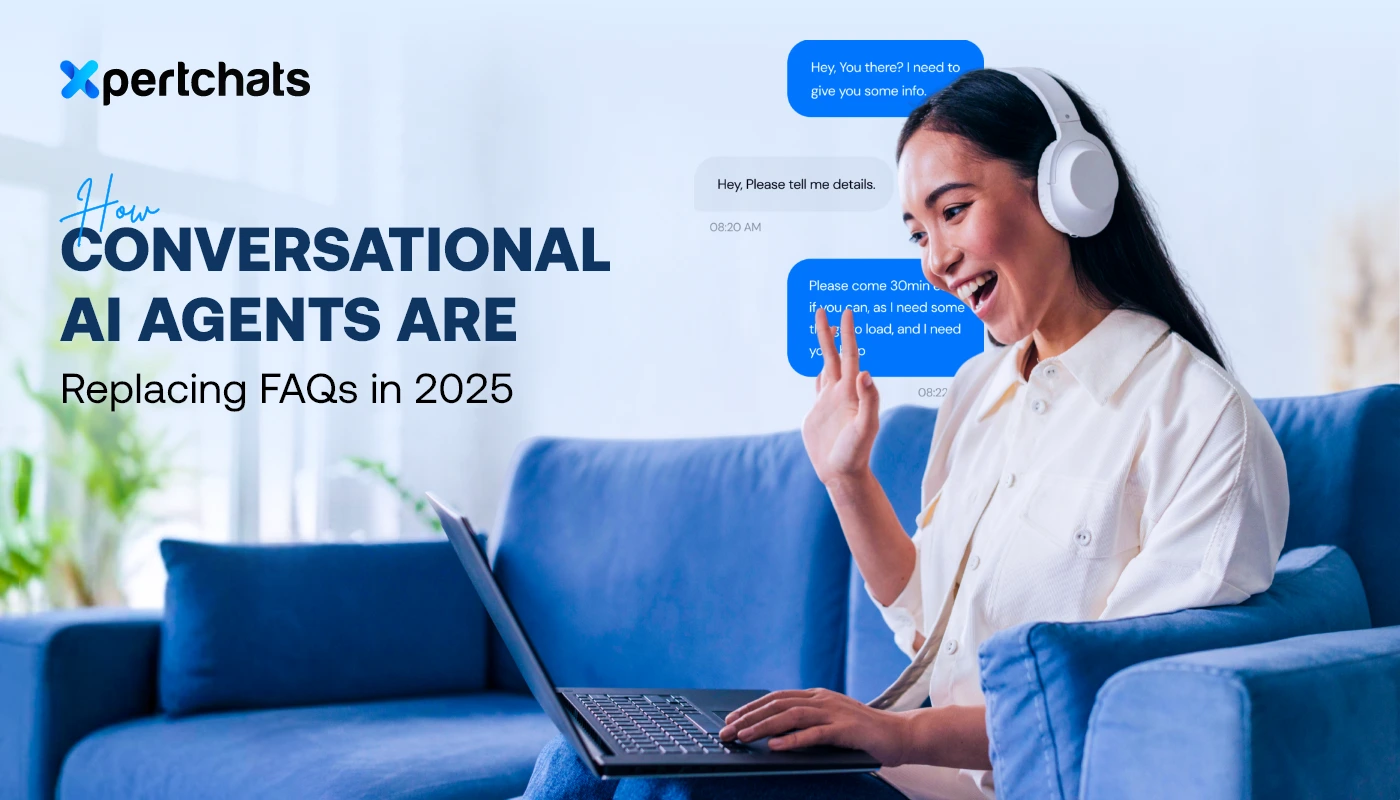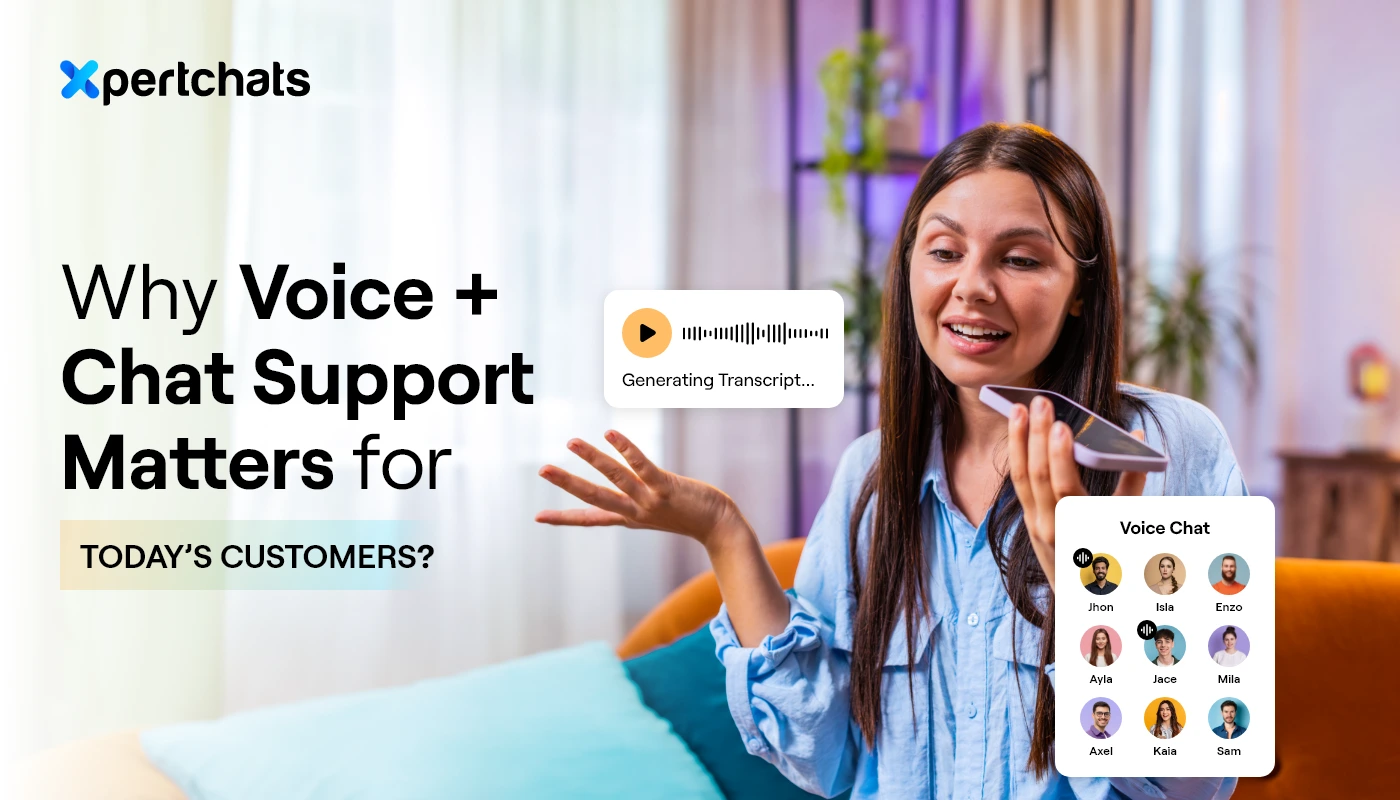
From FAQ to AI Agents: The Evolution of Live Chat in 2025
Think back to the early days of websites. If you had a question, your only hope was a long FAQ page. You’d scroll forever, skim through walls of text & sometimes never find what you were looking for.
Then live chat showed up. Finally, you could ask a real person and get an answer on the spot. It felt like magic at the time. But as businesses grew and customers wanted answers faster, even live chat started to hit its limits.
Now we’re in 2025 & live chat looks nothing like it did ten years ago. What used to be static answers has turned into smart conversations powered by AI agents. These new systems don’t just reply – they guide, personalize & connect you to exactly what you need.
This shift from FAQ pages to conversational AI agents isn’t just about technology. It’s about how people want to interact with businesses today. In this post, we’ll walk through how live chat has evolved, why it matters now more than ever & what the future holds for live chat customer support.
The Early Days: When FAQs Ruled Customer Support
In the early 2010s, if you had a question on a website, you went straight to the FAQ page. And let’s be honest, those pages were helpful only if your query was one of the “usual suspects.”
Need to know how to change your password? Sure, it was there. Want guidance on which specialist you should speak to in a virtual consultation app? Forget it.
The biggest issues with FAQs were obvious:
- Every visitor got the same canned answers.
- They couldn’t adapt or go deeper into a conversation.
- They offered zero personalization.
For industries that depend on trust-healthcare, finance, education-static FAQs were never enough. A patient on an expert advice app doesn’t want prewritten answers; they want reassurance, context & a way to act quickly.
The Rise of Live Chat Customer Support
Then came live chat customer support-and it felt like a breath of fresh air. Suddenly, you could open a small chat window and talk to a real human on the other side. No more endless scrolling through FAQ lists.
Businesses loved it because it meant:
- Customers weren’t stuck waiting on phone lines.
- Even small teams could look available around the clock with staggered shifts.
- Conversations felt personal and built trust fast.
For consultation platforms, live chat changed the game. Imagine logging into an online consultation platform, looking for a doctor or a coach & being able to clear quick doubts with a support agent before booking. That little bit of interaction often meant the difference between a visitor leaving or booking a session.
But scaling live chat was tough. Hiring and training big support teams was expensive. That’s when AI agents began to step into the picture.
The Entry of AI Virtual Agents
The first bots that popped up around 2016–2017 weren’t great. Most of them followed rigid scripts. If you typed anything slightly outside the rulebook, you’d get stuck in loops of “I didn’t understand that, please rephrase.” Frustrating.
The difference in 2025 is night and day. Modern AI virtual agents don’t just match keywords-they understand context, intent & even tone. These conversational AI agents can:
- Ask follow-up questions instead of guessing.
- Adjust answers to the user’s profile or past queries.
- Route conversations to the right human expert when needed.
- Work at scale-handling thousands of chats at once.
On a virtual consultation app, an AI agent can figure out whether a user looking for “diet advice” needs a nutritionist, a fitness trainer, or even a doctor-and guide them to book the right expert in minutes.
Why 2025 Is the Tipping Point
AI has been hyped for years, but 2025 feels different. Three things are pushing AI agents from “nice to have” to “must have”:
- Smarter AI and better NLP
Agents now understand natural language almost like humans do. They can pick up on intent, not just words.
- Changing customer expectations
People are used to instant everything-delivery, streaming, payments. They expect the same in live chat customer support.
- The boom of consultation apps
With the explosion of online consultation apps and expert advice apps, platforms are dealing with massive query volumes. AI is the only way to handle that scale without drowning in costs.
Conversational AI Agents in Action
Here’s how conversational AI in customer service is actually showing up today:
- Smart triage and routing
Instead of a human scanning every message, AI figures out what the query is about and sends it to the right expert instantly.
- Pre-consultation intake
Before booking, the AI agent collects the basics: symptoms, availability, even budget. That way, the human expert already has a starting point.
- Personalized nudges
An AI agent can remember if someone has searched for career advice before and proactively suggest the right coach when they log in again.
- Follow-ups that don’t feel robotic
Post-consultation, the AI can send reminders, ask for feedback, or share resources-keeping the relationship alive beyond the session.
Benefits for Businesses Using AI Agents
The benefits of AI virtual agents aren’t just theoretical-they’re practical:
- Handle thousands of conversations without blowing up support costs.
- Provide consistent answers every time.
- Get insights into what users are really asking, which helps improve services.
- Encourage more users to complete bookings by reducing drop-offs.
For industries where trust and quick action are critical, like healthcare or legal, that’s a big deal.
The Human + AI Hybrid Model
Here’s the truth: AI can’t fully replace humans in support or consultations. And it shouldn’t. The winning model in 2025 is a mix.
- Let AI handle repetitive queries and collect basic info.
- Bring in human experts for conversations that require empathy, judgment, or deep knowledge.
- Use AI again for follow-ups, reminders, or FAQs.
That blend means customers get speed and personalization, while businesses keep costs under control.
Virtual Consultation Platforms: A Natural Fit for AI
Why do virtual consultation platforms benefit so much from AI? Because they sit at the intersection of high volume and high trust.
- Thousands of people browse every day & not everyone books right away. AI helps nurture them.
- Needs vary widely-legal, wellness, financial advice-AI makes sure queries land in the right place.
- Personalization builds loyalty & AI is built for personalization.
When someone uses an online consultation app, they expect answers right away, not hours later. That expectation makes AI not just useful, but necessary.
Future of Live Chat: Beyond 2025
Looking a few years ahead, AI virtual agents are only going to get better. We’ll likely see:
- Agents that detect emotion and adapt replies based on mood.
- Voice-enabled chat for instant verbal consultations.
- Proactive AI-agents that reach out before you even ask.
- Seamless support across every device, from smartphones to wearables.
This will turn live chat from a reactive feature into a proactive driver of customer experience.
Final Thoughts
The journey from FAQ pages to intelligent conversational AI agents shows how far we’ve come in just a decade. In 2025, businesses can’t rely only on static content or even traditional live chat to meet customer expectations.
The next wave of live chat customer support belongs to AI-agents that can scale, personalize & integrate seamlessly with experts. And platforms like XpertChats are shaping that shift, turning everyday queries into opportunities for connection and trust.
The future of customer support isn’t just about faster replies. It’s about smarter conversations that connect people to the right expertise at the right time.
Get Started with XpertChatsFrequently Asked Questions
AI agents don’t just guess. They ask a few clarifying questions, analyze your inputs, and then match you with the right professional. For example, if you type “I need diet help,” the AI can decide if you need a nutritionist, a fitness coach, or a doctor-based on your answers.
Yes. In most online consultation platforms, the AI agent acts like a smart intake form. It gathers basic information-like symptoms, preferences, or availability-and passes it to the expert before your session starts. This saves time during the actual call.
Good AI agents don’t leave you hanging. If they don’t have the answer, they route you straight to a human expert. In a virtual consultation app, that could mean connecting you to customer support or even scheduling a session with the right professional.
Yes, most modern AI-powered consultation apps use encrypted chat and follow strict compliance rules. Your medical, financial, or personal information stays private-just like it would in a human-to-human chat.
Absolutely. Once your consultation ends, an AI virtual agent can send you reminders, share notes from the session, or check in if you need another appointment. This ongoing support is one of the biggest differences compared to old-school live chat.
Recent Blogs
If there’s one truth modern businesses can’t ignore, it’s this: customers don’t want support. They want instant, frictionless, human-like experiences. And they want them on. Read more
The demand for virtual consultation platforms is skyrocketing. From healthcare and legal consultations to coaching, fitness & education, people are increasingly turning to online consultation. Read more
Let’s face it - people are tired of generic experiences. When users turn to a virtual consultation app or an expert advice platform, they don’t. Read more


